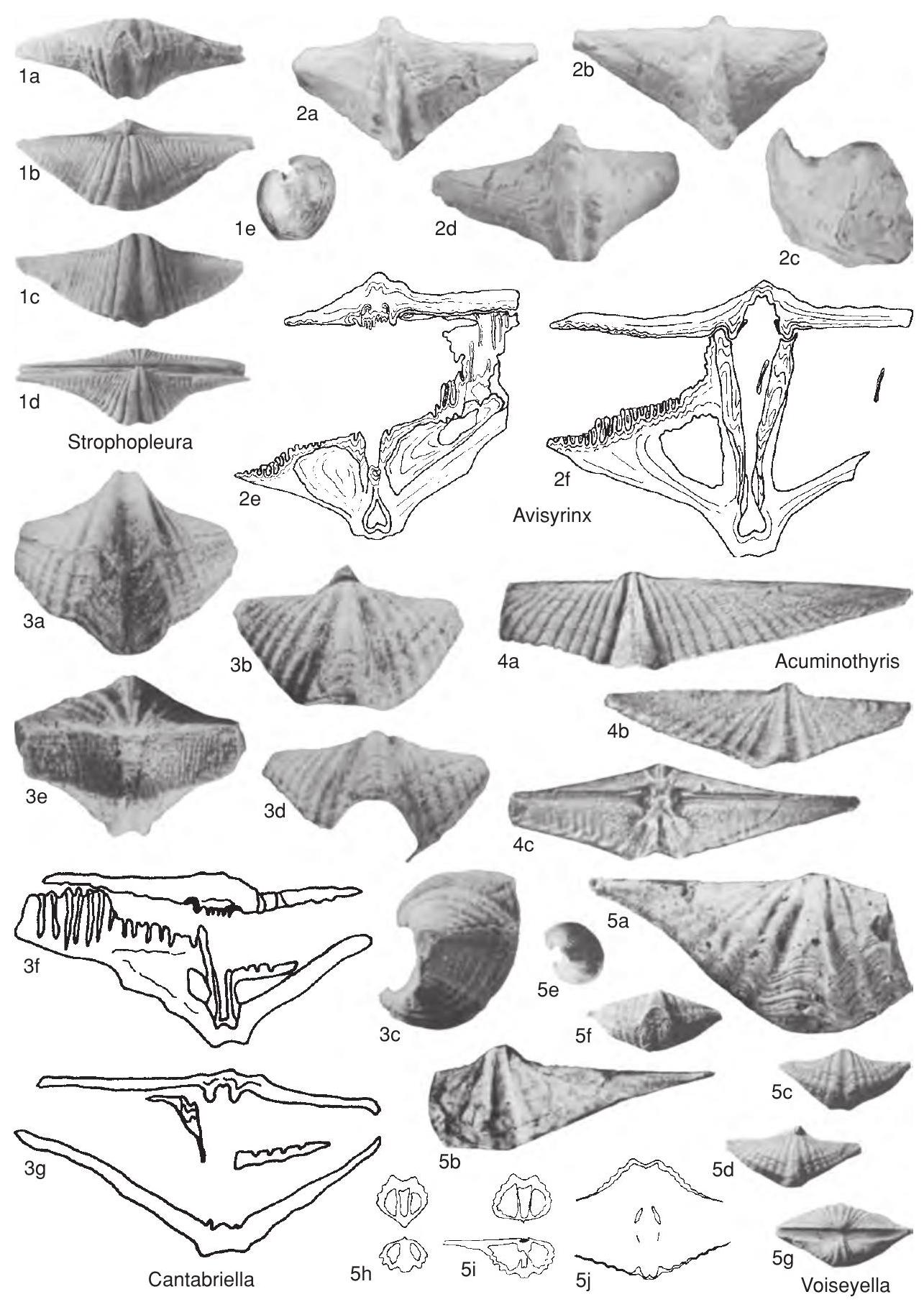Welcome to the Treatise on Invertebrate Paleontology!
Please enter a genera name to retrieve more information.

Voiseyella
Classification
Phylum:
Brachiopoda
Subphylum:
Rhynchonelliformea
Class:
Rhynchonellata
Order:
Spiriferida
Suborder:
Spiriferina
Superfamily:
Paeckelmannelloidea
Family:
Strophopleuridae
Subfamily:
Strophopleurinae
Formal Genus Name and Reference:
Voiseyella ROBERTS, 1964, p. 187
Type Species:
Strophopleura anterosa CAMPBELL, 1957, p. 79, OD
Images
(Click to enlarge in a new window)
Fig. 1201, 5a-b. *V. anterosa (Campbell), a, dorsal valve exterior, X2.5, b, ventral exterior, X2 (Roberts, 1964)., Fig. 1201, 5c-j. V. novamexicana (Miller), upper Tournaisian, New Mexico, c-g, ventral, dorsal, lateral, anterior, and posterior views, X1, h-j, transverse sections, X2 (Carter, 1967b).
Synonyms
Amesopleura
Geographic Distribution
Australia, USA (Texas, Missouri, New Mexico), Canada (Alberta)
Age Range
Beginning Stage in Treatise Usage:
Carboniferous (middle Tournaisian)
Beginning International Stage:
Tournaisian
Fraction Up In Beginning Stage:
33
Beginning Date:
355.15
Ending Stage in Treatise Usage:
Carboniferous (middle Visean)
Ending International Stage:
Visean
Fraction Up In Ending Stage:
66
Ending Date:
335.91
Description
Small, strongly biconvex, strongly transverse, with mucronate cardinal extremities, fold and sulcus narrow, noncostate and rounded, sulcus delimited by disproportionately large sulcus-bounding costae and fold by disproportionately deep and wide foldbounding interspaces, flanks with moderately numerous simple ribs that become smaller or indistinct laterally, growth lamellae becoming crowded and lamellose anteriorly, ventral interior with short, slender dental adminicula that follow margins of sulcus, dorsal interior with thick apical callus supporting cardinal process and long, platelike ridges that extend forward along inner crests of foldbounding grooves. [A denticulate hinge line has not been established for this genus.]
References
Museum or Author Information
Classification
Phylum:
Brachiopoda
Subphylum:
Rhynchonelliformea
Class:
Rhynchonellata
Order:
Spiriferida
Suborder:
Spiriferina
Superfamily:
Paeckelmannelloidea
Family:
Strophopleuridae
Subfamily:
Strophopleurinae
Formal Genus Name and Reference:
Voiseyella ROBERTS, 1964, p. 187
Type Species:
Strophopleura anterosa CAMPBELL, 1957, p. 79, OD
Images
(Click to enlarge in a new window)
Fig. 1201, 5a-b. *V. anterosa (Campbell), a, dorsal valve exterior, X2.5, b, ventral exterior, X2 (Roberts, 1964)., Fig. 1201, 5c-j. V. novamexicana (Miller), upper Tournaisian, New Mexico, c-g, ventral, dorsal, lateral, anterior, and posterior views, X1, h-j, transverse sections, X2 (Carter, 1967b).
Synonyms
Amesopleura
Geographic Distribution
Australia, USA (Texas, Missouri, New Mexico), Canada (Alberta)
Age Range
Beginning Stage in Treatise Usage:
Carboniferous (middle Tournaisian)
Beginning International Stage:
Tournaisian
Fraction Up In Beginning Stage:
33
Beginning Date:
355.15
Ending Stage in Treatise Usage:
Carboniferous (middle Visean)
Ending International Stage:
Visean
Fraction Up In Ending Stage:
66
Ending Date:
335.91
Description
Small, strongly biconvex, strongly transverse, with mucronate cardinal extremities, fold and sulcus narrow, noncostate and rounded, sulcus delimited by disproportionately large sulcus-bounding costae and fold by disproportionately deep and wide foldbounding interspaces, flanks with moderately numerous simple ribs that become smaller or indistinct laterally, growth lamellae becoming crowded and lamellose anteriorly, ventral interior with short, slender dental adminicula that follow margins of sulcus, dorsal interior with thick apical callus supporting cardinal process and long, platelike ridges that extend forward along inner crests of foldbounding grooves. [A denticulate hinge line has not been established for this genus.]
